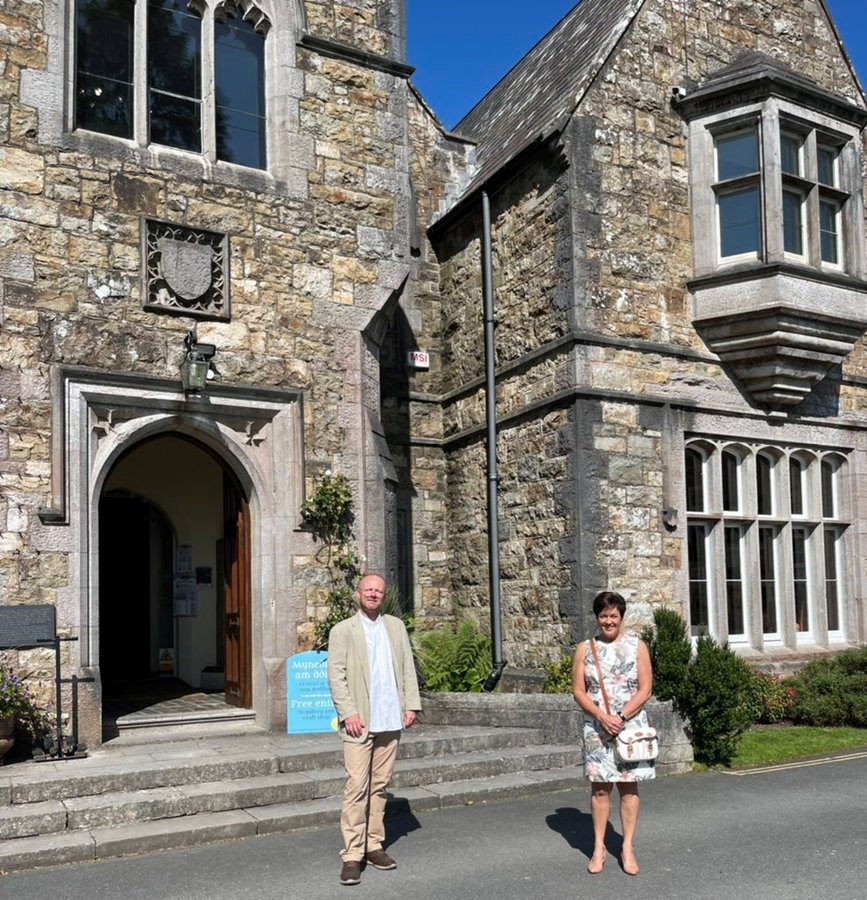
Cultural Recovery Fund – gives life line to heritage sector
Gronfa Adferiad Diwylliannol – yn helpu i gynnal y sector treftadaeth
During visits to north Wales this week, Deputy Minister for Arts and Sport, Dawn Bowden met with recipients of the Welsh Government’s Cultural Recovery Fund – to see how funding has helped keep organisations afloat and safeguard jobs during a challenging time for the sector.
Oriel Plas Glyn y Weddw Arts Centre in Llandedrog, Pen Llŷn is now welcoming visitors again. During the pandemic Plas Glyn-y-Weddw has been awarded £291,000 from the Welsh Government Cultural Recovery Fund administered by Arts Council of Wales – which has in turn saved 20 jobs and protected the charity from closure
Gwyn Jones, Director, said: “We have followed Welsh Government guidelines from the outset of the pandemic at Plas Glyn y Weddw and have felt protected right through this unprecedented crisis. Without the Cultural Recovery Fund Plas Glyn y Weddw would have been lost along with over 20 jobs and 70 volunteering opportunities. We will forever be indebted to First Minister, Mark Drakeford and his team for the support given and will work hard to help regenerate the Welsh economy moving forward."
With an eye on the future, Oriel Plas Glyn y Weddw are looking forward to continuing with the redevelopment of the artist inspired café and kitchen which has also received support from the Welsh Government and will be an added attraction for the Oriel’s 140,000 visitors each year.
The Deputy Minister also visited Llangollen Railway. Llangollen Railway Trust Ltd manages the Heritage Railway which operates a 10 mile track through the heart of the Dee Valley between Llangollen and the village of Carrog. Besides the preservation and ongoing maintenance of a fleet of rolling stock it preserves and manages four heritage station complexes.
The Welsh Government has provided two rounds of Cultural Recovery Fund grants to the Llangollen Railway Trust, totaling more than £290,000 to help with running services and restarting operations.
Deputy chairman Phil Coles said, “I was very pleased the minister visited Llangollen Railway and met with Board members for an update on progress. We were able to express our thanks for the grant which will allow LRT to recover and re-open train services in the Dee Valley later in the summer when steam trains will be able to run again to Carrog.”
Across both phases of the Cultural Recovery Fund the Welsh Government has provided £93m of funding which has supported business, organisations and individuals in these key sectors.
The first phase of the Cultural Recovery Fund, supported 646 businesses and 3,500 individuals with funding of £63m. The Welsh Government allocated £30m for a second phase of funding to continue to support the sector. This second phase was put in place to support the sector until the end of September.
Deputy Minister, Dawn Bowden, said: “The cultural sector has continued to be significantly impacted by the pandemic – and it’s good to speak to these heritage attractions to learn more about the challenges they have faced and their optimism for the future.
“We continue to liaise with the sector as we relax restrictions and look towards the new alert level zero and a future with fewer legal rules. We will keep the need for any additional support under review to ensure the future sustainability of the sector.”
Notes to editors
Notes
- Across both phases of the Cultural Recovery Fund we have provided £93m of funding which has supported business, organisations and individuals in these key sectors.
- The Arts Council has offered a total of £8.8m to 127 arts organisations.
- As part of this second round, the Welsh Government has continued to support businesses and organisations in the areas of creative industries, events, heritage and culture. As our Programme for Government makes clear, we are doing everything we can to support the visitor economy and by the end of this month will have offered £19m to more than 500 organisations.
